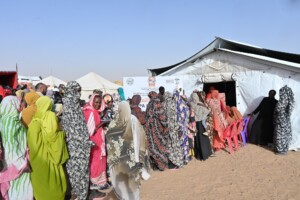Sudan’s Islamic Studies exam for secondary schools slated by Muslim critics
The head of Sudan’s Islamic Judicial Council that rules on matters of Sharia law, Imam Abdelgadir Abdelrahman, has harshly criticised questions in the Islamic Studies examination set for secondary school students.
 The Grand Mosque at the El Soug El Arabi in downtown Khartoum (File photo: The Age)
The Grand Mosque at the El Soug El Arabi in downtown Khartoum (File photo: The Age)
The head of Sudan’s Islamic Judicial Council that rules on matters of Sharia law, Imam Abdelgadir Abdelrahman, has harshly criticised questions in the Islamic Studies examination set for secondary school students.
The Imam described the tone of the exam as “advocating chaos, arrogance, ridicule, and hatred of religion among adolescent students”.
One question in the examination, which provoked reactions and ridicule on social media, asks: “If a man had sex with a woman and then was surprised that she was not his wife, what is the penalty? To be flogged, stoned or pardoned?”
Imam Abdelrahman: “How can they ask them about the penalty on a man who committed adultery with a woman whom he thought was his wife, whether he shall be stoned, flogged or none of the penalties he shall deserve; as if we were in total darkness or in a refugee camp so that a man confuses his wife with another woman?”
He called Islamic Fiqh Academy and the Association of Sudanese Scholars to respond to such dilemmas and ridicule.
Red Sea State
The Sudanese secondary school students sitting for the examinations from El Salloum centre of Ganab and Ulib locality in Red Sea State protested against power and water outages on Sunday and Monday.
Journalist Osman Hashim told Radio Dabanga that the locality students are being gathered in a boarding house at El Salloum area to perform exams at the only examination centre in the locality. He said that the electricity generation in the area was unable to generate the electricity needed to illuminate the boarding house, which includes dozens of students at a time when water services were interrupted and pointed to the great impact of the power outage on the students' study.
Hashim reported that parents of the students were upset of the power and water cuts and called on the state government to intervene urgently to resolve the problem.











 and then
and then